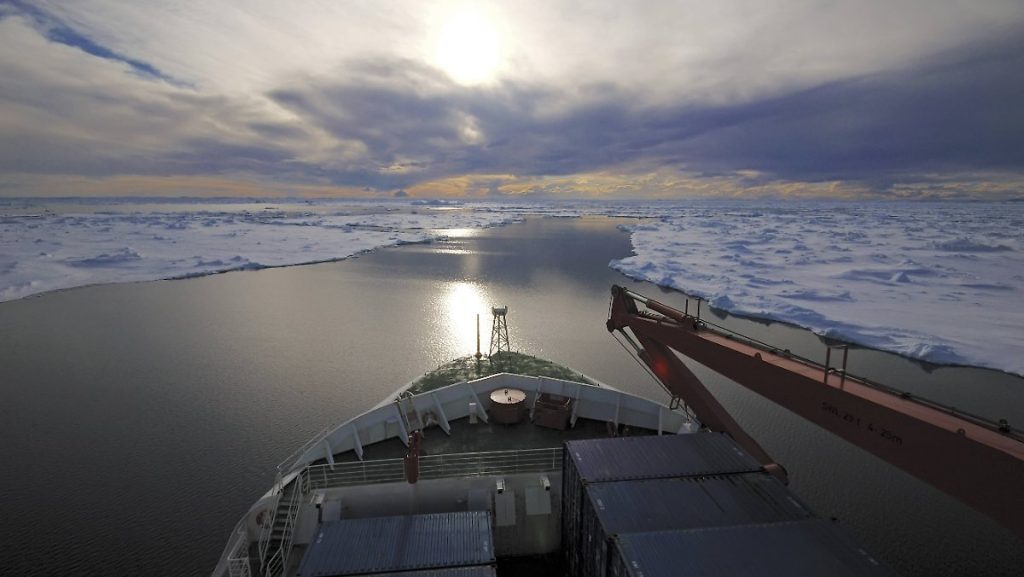Shorter Shipping Methods
An ice-free Arctic could help protect the climate
06/20/2022, 7:21 PM
Global warming is melting the ice in the Arctic. This threatens the survival of many species. However, the researchers also point to an opportunity: merchant ships are suddenly able to use shorter, less climate-damaging routes.
In just a couple of decades, some Arctic regions that were previously covered with year-round ice could be ice-free for months. US researchers report that this threatens the survival of many species, but also opens up new, shorter, and therefore more environmentally friendly routes for merchant ships bypassing the Russian-controlled Northern Sea Route. Proceedings of the US National Academy of Sciences (“PNAS”). They demand that international shipping regulations must be adapted to the conditions now expected.
“There is no scenario in which the melting of Arctic ice is good news,” said Amanda Lynch of Brown University. “But the unfortunate reality is that the ice is already retreating, these roads are opening up, and we need to start thinking critically about the legal, environmental and geopolitical implications.”
The researchers used modeling to predict how the Arctic ice sheet would develop over the coming decades under different emissions scenarios. Specifically: How high is the probability in the years between 2015 and 2065 that the area will be ice-free for at least 32 consecutive days. Possible new routes from Rotterdam towards the Bering Strait include the Northwest Passage along the east coast of Greenland through the Davis Strait or the Transpolar Route between Greenland and Iceland.
Russia uses the road for its own interests
As expected, the data shows that the probability of continued ice-free conditions increases over time across all scenarios. For example, as high emissions and energy-intensive lifestyles persist worldwide, the likelihood of a navigable season outside Russian waters increases by about 30 percent. In the lowest emission scenario, it is unlikely that the passage will be possible until mid-century. However, according to the calculations, fluctuations from year to year remained significant.
The researchers focus their work primarily on the effects of climate change on Article 234 of the United Nations Convention on the Law of the Sea. This gives Arctic countries such as Canada and Russia control over the movement of shipping in the waters in order to prevent or reduce pollution of the waters or coasts by ships. According to the authors, Russia used this right in the past mainly to assert economic and geopolitical interests. For example, a Russian law states that all ships navigating the Northern Sea Route must be commanded by Russians. Shipping companies will also have to pay high fees and register their travel plans. This causes many companies to switch to longer routes, for example through the Suez Canal or Panama.
However, researchers are convinced that the validity of Article 234 will be limited in the future. It is only valid as long as the area is covered with ice most of the year. The international community will discuss Russia’s control of the maritime area in the future. “That’s not all: As the ice melts, maritime traffic will move from Russian territorial waters to international waters,” says co-author Charles Norchy of the University of Portland Law School. Russia can do little about it.
Arctic routes are shorter and faster
According to previous studies, Arctic paths are shorter and faster, the researchers wrote. Shipping companies can significantly reduce greenhouse gas emissions while saving money and time. The consequences of climate change and its legal consequences for Arctic shipping and global maritime trade are far-reaching.
“Addressing these impending changes now may prevent it from developing into a crisis that needs to be resolved quickly, and that never ends well,” Lynch said. “Forging international agreements with some foresight and thought is certainly the best way.”

“Total coffee aficionado. Travel buff. Music ninja. Bacon nerd. Beeraholic.”







More Stories
How did life begin on Earth? Munich researchers find important clues
Everything related to prevention and treatment
The European Space Agency announces “signs of spiders on Mars”